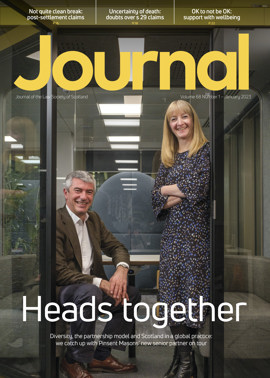Assets, experts and fair sharing

The judgment of Lady Carmichael in Macdonald v Macdonald [2022] CSOH 84 (25 November 2022) is a decision regarding financial provision on divorce which has points of interest for future cases.
The parties were married on 9 August 2002 and separated on 27 May 2019, the relevant date for the purposes of the Family Law (Scotland) Act 1985. Matters in dispute were primarily valuation issues, along with arguments for unequal sharing of the net matrimonial property. The third focus of this article will be the admissibility of expert evidence.
Valuation issues
There were two primary disputes with regard to valuation: corporate interests and rural land.
On the latter, the wife pursuer led a rural property surveyor and also a chartered forester as part of the land was woodland. The forester’s evidence was preferred to the defender’s more generalist rural surveyor. It is always worth enquiring of an expert whether onward referral to another expert might assist in valuation.
The largest asset by far was a company (“MGL”) of which the defender was sole shareholder. Each party led an expert forensic accountant. By the proof the accountants had agreed on the future maintainable earnings. Three issues were disputed: the multiplier (which turned on the specifics of this case); the net debt (including deduction of corporation tax); and whether net asset value should be used as a backstop valuation.
Macdonald v Macdonald represents an evolution of the law about corporation tax. Lord Tyre’s decision in W v W 2013 Fam LR 85 was distinguished. Lord Tyre did not treat liability for corporation tax as net debt, describing it as a “haggle point”. Lady Carmichael preferred the evidence of the defender’s expert witness, who spoke to an evolution in practice in the market such that although 10 or 15 years ago there would have been an argument as to whether corporation tax liabiity should be treated as working capital or debt, it was now generally accepted as a debt-like item (on the basis that the seller had enjoyed the profit and should bear the tax).
However, Lord Tyre’s approach was adopted in relation to another element of net debt. MGL had committed to purchase plant and equipment but had not completed the purchase at the relevant date. This was regarded by the court as a “haggle point” and therefore left out of account in calculating the net debt figure.
The most striking valuation point is the court’s discussion of the role of the net asset value when valuing a shareholding on an enterprise basis. The pursuer’s expert adopted the conventional view that, absent any special factors, the value of a company cannot fall below the value of its net assets. This was a case in which there were no supervening factors which might justify a sale of the shares on the open market at below net asset value (for example, significant anticipated changes in the company’s market or forced relocation of a business particularly dependent on its location). The court’s enterprise valuation brought out a value less than the court’s net asset valuation. The lower figure was used for the purpose of valuing the defender’s 100% shareholding.
Of course, this is only one Outer House decision. The role of the forensic accountant is unchanged by this decision. Agents’ instructions to forensic accountants should continue to seek expert opinion as to what a willing buyer would pay to a willing seller on the open market at arm’s length. However, it is important to ask valuers to explain why they say that a valuation should not fall below net asset value. Equally, when cross examining a valuer who has used a net asset basis, Lady Carmichael’s approach should be put to the witness. In the writer’s view it is unlikely that valuation orthodoxy will be altered by this decision, but that remains to be seen.
Minority discount
The defender was also a 50% shareholder in another company, “HRL”. One point is of broader interest. The expert witnesses disagreed about whether a discount should be applied for the fact that the defender’s shareholding was only 50%, where a 75% shareholder vote was required to pass special resolutions. The pursuer’s expert had applied no discount, on the basis that this business was a quasi-partnership and there was a clear understanding that the defender had rights beyond those set out in the articles including the right to withdraw his capital. Her counsel relied in argument on Lord Hoffmann’s dicta in O’Neill v Phillips [1999] 1 WLR 1092.
Lady Carmichael noted that Lord Hoffmann’s dicta were in the context of considering the existence of unfair prejudice, commenting: “His remarks are not of assistance in determining whether a discount is appropriate in a valuation of a shareholding.” The pursuer’s approach would take into account factors that relate to buyers with particular characteristics (for instance, if the most likely purchaser was the other shareholder or the company). That was not consistent with an arm’s length transaction between a notional willing buyer and willing seller. The court therefore did in effect apply a “minority” discount to the valuation of the 50% shareholding.
Arguments for unequal sharing
The case exhibits the full gamut of arguments around unequal sharing, almost all of which were advanced in various respects by each party. Not all will be of future relevance, but those which might be useful examples to refer to are:
Secured debt had been reduced by the defender’s post-separation payments and he sought reimbursement, characterising this as an economic disadvantage/advantage. He was given credit, but only in part because he had occupied the jointly owned properties since separation.
Company MGL had incurred expense which increased the value of the matrimonial land. The court declined to treat expenditure by the company of which the defender was sole shareholder as his personal expenditure.
The pursuer had retained the proceeds of the joint account and the defender sought credit for half of that sum. He was given credit based on s 9(1)(b), but under deduction of the court’s assessment of the pursuer’s alimentary need during a period when no aliment was paid.
The defender argued that the funds used to acquire jointly owned heritable property had come from inheritance/lifetime gift from his parents. The pursuer lodged the declaration made to HMRC by the defender as his father’s executor, which was inconsistent with this position. The defender received a warning about the privilege against self-incrimination and that the court might make a reference to COPFS. The pursuer accepted that there was an element of inheritance/third party gift and the court gave the defender credit in terms of s 10(6) to that extent.
The overall approach taken to arguments for unequal division is a hybrid of forensic consideration of their constituent parts and then a broad approach on the extent of the departure from equal sharing.
The defender had either ownership or effective practical control of nearly the full extent of the net matrimonial property, and accordingly periodical allowance was awarded until payment of the majority of the pursuer’s capital entitlement.
Expert evidence
The pursuer had led expert evidence concerning the parties’ likely exposure to capital gains tax. The defender objected on the basis that the witness was speaking to matters of law. The evidence was heard subject to competency and relevancy. It was held inadmissible except insofar as relating to HMRC practicalities, because “Matters of domestic law are for the court, as is the application of that law to the facts of the case.”
In the writer’s view this approach is the correct interpretation of the Supreme Court’s decision in Kennedy v Cordia (Services) [2016] UKSC 6. However, it poses real practical problems. If it is correct to say that the evidence of a tax expert is inadmissible, then it must be assumed either that every judge and sheriff has sufficient expertise in UK tax law to be able to apply it correctly, or that counsel or agents will be in a position to address the court on the law as it relates to taxation of assets on divorce. The writer professes no such expertise! It may be conceivable that in the highest value Court of Session cases, counsel (or specialist tax counsel) will be in a position to make such submissions. However, for the majority of cases in both courts, it is more practical to lead evidence from a tax accountant. Such evidence will be of considerable assistance to parties, to advisers and also to the court. Kennedy v Cordia is, in this instance, practically unhelpful.
Separately, the pursuer’s forensic accountant submitted a report adjusting his opinion shortly prior to proof. Counsel for the defender submitted that the court should therefore attach little weight to his evidence. That submission was categorically rejected. The expert had become aware of more information at a relatively late stage, after experts had met, when it became apparent that the defender had furnished his own expert with information that had not been provided in response to the pursuer’s expert’s queries. As the judgment puts it, “That is the point of experts meeting.”
Conclusion
This case illustrates the importance of forensic preparation of arguments justifying unequal division, but also the practical impossibility for the court in adopting a wholly forensic approach to its determination. It also illustrates the vital role of experts and the care that must be taken by agents in their instruction.
Expenses: a departure from practice
Prior to publication of the judgment, the court was addressed on the terms of the order to be granted and on expenses. It issued a very detailed interlocutor with supporting reasons on expenses (extending to some 10 pages). That in itself is significant: the court was prepared to dedicate time and attention to proper consideration of every single element of expenses, again applying a more forensic approach rather than a broad brush.
The key point for which this case will be critical in future is that Lady Carmichael accepted the invitation of counsel to fix the percentage uplift for the additional fee sought. While that is common practice in the sheriff court, it has never been accepted practice in the Court of Session. However, Lady Carmichael took a similar approach to the Lord Ordinary in Philips v Scottish Ministers [2021] CSOH 52 in deciding that she should determine the level of uplift herself and determining what level that should be. She considered submissions made under each of the heads in the Act of Sederunt (Taxation of Judicial Expenses) 2019 and specified the weight attached to each.
Regulars
Perspectives
Features
Briefings
- Civil court: Costs – the tail that wags the dog
- Licensing: Keeping alcohol out of sight
- Planning: A framework for sustainability?
- Insolvency: When is a creditor not a creditor?
- Tax: A new, improved autumn statement?
- Immigration: First stop Rwanda?
- Scottish Solicitors' Discipline Tribunal: January 2023
- Civil court: Expenses – barred by delay?
- Property: Transparency, human rights and the registers







